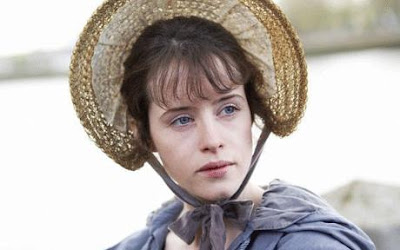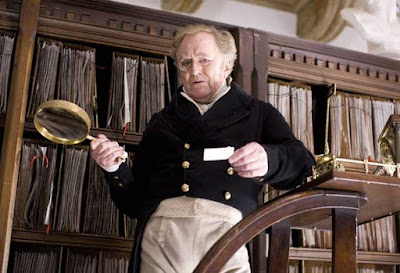Last night I gritted my teeth and made it through the final episode of The Great on Hulu.
The shameful reality is that I am a pearl-clutching prude and have a very low threshold for stories that are stressful and violent. The Great was too vulgar, too gory, and too intense for me. But I also recognize that it was witty, well written, and beautifully filmed. There was a lot of it that was good and I hope those parts have a positive impact on future period movies and TV.
Which brings me to a little thesis I've been working on. Whenever there is a "fresh take" period drama, it usually falls into one of two categories:
Category 1: The filmmakers believe history (or the historical novel they are adapting) is inherently boring and so thankfully they are here to spice it up. They don't trust the material and they don't trust the audience. They think their revisions are necessary to make the story palatable.
Category 2: The filmmakers believe that history (or the historical novel) is inherently interesting and speaks to our time, and so they want to infuse some modern elements and have fun with it. They genuinely love the material and want to share it in a new way.
Even though I have a fondness for it, The Tudors is an example of Category 1. The King Henry VIII story is already a wild ride. It doesn't need to be sexed up and have added plotlines about Henry's horny friends or Thomas Tallis being haunted by his dead girlfriend. It makes for a very uneven show that doesn't really know what it wants to be. I also think the 2005 Pride & Prejudice falls under this category too. To me, it feels like the filmmakers looked through the book and were like "yikes we need to fix all these boring parts."
I would argue that every good period movie, TV show, or play falls under Category 2--as there is always some degree of a modern perspective infused into the storytelling. Emma Thompson's Sense and Sensiblity may seem like a standard period film, but Thompson used very little of Jane Austen's original dialog, cut some important scenes, and invented others. It was also directed by Ang Lee, which had some xenophobes worried about how this Chinese director would handle an English classic. The movie is phenomenal because both Thompson and Lee cared about the source material but were also willing to try new things with it.
Which is all to say that The Great is Category 2, which is why I respect it, even though it wasn't to my personal taste.
One of the best aspects of The Great's modern take is that the cast has some racial diversity. There are a fair number non-white courtiers even though we know that wasn't the case historically. It is interesting that while many period movies are happy to play fast and loose with other aspects of history, diverse casting still feels like a taboo. Maybe it is because the general public doesn't know that an 18th century gown shouldn't have metal grommets, but they do have a sense that there weren't a lot of Black aristocrats in 18th century Europe. But a dumb anachronism like a metal grommet or a corset worn without a chemise doesn't actually add much to a story. Actors though add a lot, as they can have an exciting take on a character that someone else wouldn't have. If you are relaxing your historical accuracy, diverse casting is more likely to make a show good than throwing in some cheesy, sexy costumes.
BAD
Atrocious dress in War & Peace (2016)
GOOD
Black court ladies in fabulous dresses in The Great
So this is how I hope The Great will influence period pieces that come after it. If you are working with exciting material set in a historical period, it is OK to be playful and take a risk. You can have anachronisms just make them intentional and smart.
But if you think history is boring, maybe just step away.



























































